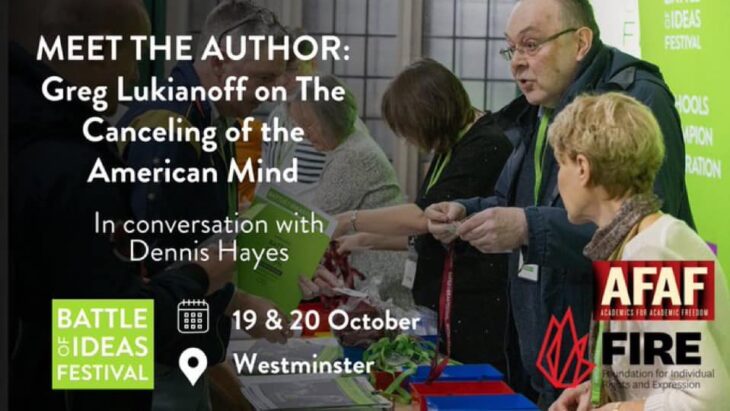
The Canceling of the American Mind
From universities to public office, schools to social clubs, the pernicious reach of cancel culture seems to know no bounds. While ‘cancellation’ may once have been reserved for high-profile celebrities, now everyone – from charity directors to porters, activists to comedians – is vulnerable to being censored and punished for holding the ‘wrong’ opinions. Social ostracisation, career derailment and even jail sentences are a genuine threat to those who seek to speak freely.
However, critics of the very idea of ‘cancel culture’ argue that a changing attitude to public discourse is a good thing – with protective measures and accountability providing safe spaces for historically marginalised communities. Cancel culture, they say, is merely ‘consequence culture’ – an overdue course correction to rein in old-fashioned bigotry. Social media and the internet have presented new challenges – from fake news to trolling – with many now arguing that free speech is simply too rife with dangers to be allowed.
In The Canceling of the American Mind, the president of the Foundation for Individual Rights and Expression (FIRE), Greg Lukianoff, and his co-author Rikki Schlott explore how workplaces and universities across all domains – including science, medicine, media, academia, finance and law – have internalised a culture of fear about expressing dissenting views. Moreover, they have adopted the practice of strategically quelling speech unpopular among the elite (by which the authors effectively mean ‘the ruling class’). Meticulously documenting cancel culture as a pervasive force that has taken over American institutions, Lukianoff and Schlott point out that Britain has not been immune to cancel culture either, from the firing of Kathleen Stock and cancellation campaigns against JK Rowling to the suspension of Cambridge’s Nathan Cofnas.
Building upon his groundbreaking text, The Coddling of the American Mind – which has influenced much of the understanding of the roots of cancel culture – Lukianoff articulates the dire problems present in political engagement across the English-speaking world. Should we resist the pessimism underlying ‘You Can’t Say That!’ culture, and try to figure out concrete solutions to reclaim a culture of free speech? Or are sceptics right, that free speech is too dangerous in a febrile public square – particularly online? And, as Lukianoff suggests, are the problems with cancel culture both external in our institutions and bureaucracies, and internal – with the ever-present need to check our own inclinations to cancel our adversaries and stand up to the policemen in our own heads?
Date, Time and Venue: Sunday 20 October, 10.00, Church House, Westminster, London, UK.
A Battle of Ideas session. The Academy of Ideas offers all AFAF and SAFAF supporters 20% off weekend and one-day standard and concession tickets to the #BattleFest.
About Greg:
Greg is an attorney, New York Times best-selling author, and the president and CEO of the Foundation for Individual Rights and Expression (FIRE). He is the author of Unlearning Liberty: Campus Censorship and the End of American Debate, Freedom From Speech, and FIRE’s Guide to Free Speech on Campus. He co-authored The Coddling of the American Mind: How Good Intentions and Bad Ideas Are Setting Up a Generation for Failure with Jonathan Haidt.
Most recently, Greg co-authored The Canceling of the American Mind: Cancel Culture Undermines Trust and Threatens Us All—But There Is a Solution with Rikki Schlott. Greg is also an executive producer of Can We Take a Joke? (2015), a feature-length documentary that explores the collision between comedy, censorship, and outrage culture, both on and off campus, and of Mighty Ira: A Civil Liberties Story (2020), an award-winning feature-length film about the life and career of former ACLU executive director Ira Glasser.
Follow Greg on X/Twitter: @glukianoff
About Dennis
Dennis Hayes is emeritus professor of education at the University of Derby and visiting professor at the University of Buckingham. He is the founder and director of the campaign group Academics For Academic Freedom (AFAF).
Dennis is the author and editor of many books, including The McDonaldization of Higher Education (the introduction to the book is available here) and a follow-up work Beyond McDonaldization: visions of higher education. In 2008, he co-authored, with Kathryn Ecclestone, the controversial and bestselling book, The Dangerous Rise of Therapeutic Education, which has been described as ‘one of the most important books to have been written in at least the last 20 years in that crucial area where philosophy, policy and practice coincide’. It was re-issued in February 2019 in the Routledge Education Classic Editions series with a new introduction. His latest book, The Death of Academic Freedom? Free speech and censorship on campus , will also be published by Routledge in 2024.
Follow Dennis on X/Twitter: @ProfDHayes

